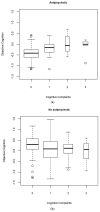Exploring Clinical Correlates of Metacognition in Bipolar Disorders Using Moderation Analyses: The Role of Antipsychotics
- PMID: 34640367
- PMCID: PMC8509459
- DOI: 10.3390/jcm10194349
Exploring Clinical Correlates of Metacognition in Bipolar Disorders Using Moderation Analyses: The Role of Antipsychotics
Abstract
The determinants of metacognition are still poorly understood in bipolar disorders (BD). We aimed to examine the clinical determinants of metacognition, defined as the agreement between objective and subjective cognition in individuals with BD. The participants consisted of 281 patients with BD who underwent an extensive neuropsychological battery and clinical evaluation. To assess subjective cognition, participants provided a general rating of their estimated cognitive difficulties. Clinical characteristics of BD were also recorded, along with medication. We studied the potential moderation of the association between cognitive complaints and global objective cognitive performance by several clinical variables with ordinal logistic regressions. Depression and impulsivity were associated with greater cognitive complaints. The only variable that moderated the relationship between objective and subjective cognition in the global model was the prescription of antipsychotics. Patients taking antipsychotics had a poorer association between cognitive complaints and objective neuropsychological performance. This result suggests a role for dopamine in the modulation of metacognitive performance, and calls for the systematic control of antipsychotic medication in future studies documenting metacognitive deficits in severe and persistent mental disorders. Depression and impulsivity should be investigated as potential therapeutic targets for individuals with BD and cognitive complaints, before proposing an extensive neuropsychological evaluation.
Keywords: antipsychotic; bipolar disorders; cognition; cognitive complaints; impulsivity; metacognition.
Conflict of interest statement
The authors declare no conflict of interest. The funders had no role in the design of the study; in the collection, analyses, or interpretation of data; in the writing of the manuscript, or in the decision to publish the results.
Figures
References
-
- Favaretto E., Bedani F., Offredi A., Schroffenegger M., Sassaroli S., Ruggiero G., Fagiolini A., Caselli G. Metacognitions and Repetitive Negative Thinking in Bipolar Disorder and Healthy Controls: A Comparative Study. J. Affect. Disord. 2020;276:152–158. doi: 10.1016/j.jad.2020.07.013. - DOI - PubMed
Grants and funding
LinkOut - more resources
Full Text Sources


